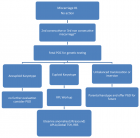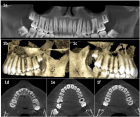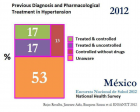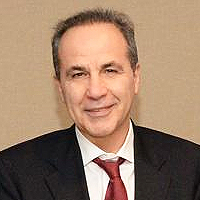Abstract
Opinion
The real-time information provision problem in assessing rehabilitation needs among athletes with overtraining syndrome
Panagiotis Katrakazas
Published: 12 August, 2022 | Volume 6 - Issue 2 | Pages: 009-010
One of the biggest challenges in sports medicine is the return-to-play decisions, making or breaking athletic careers. Since there are no protocols to guide team physicians and consultants for athletes with fatigue syndrome, illness, injury, or overtraining syndrome, real-time monitoring plays a crucial role in such cases. By monitoring a combination of performance (e.g., maximal lactate concentration, maximal heart rate at lactate threshold), physiological (e.g., resting heart rate and maximal heart rate), biochemical (e.g., glucose) and hormonal (e.g., cortisol) variables, there should be objective indices determining eligibility or disqualification for the ill or injured athletes, allowing rehabilitation practitioners to improve and adjust their plan accordingly on a real-time information provision basis.
Read Full Article HTML DOI: 10.29328/journal.jnpr.1001044 Cite this Article Read Full Article PDF
References
- Cadegiani FA, Kater CE. Novel insights of overtraining syndrome discovered from the EROS study. BMJ Open Sport Exerc Med. 2019 Jun 20;5(1):e000542. doi: 10.1136/bmjsem-2019-000542. PMID: 31297238; PMCID: PMC6590962.
- Aune D, Schlesinger S, Hamer M, Norat T, Riboli E. Physical activity and the risk of sudden cardiac death: a systematic review and meta-analysis of prospective studies. BMC Cardiovasc Disord. 2020 Jul 6;20(1):318. doi: 10.1186/s12872-020-01531-z. PMID: 32631241; PMCID: PMC7336483.
- Bonaventura JM, Sharpe K, Knight E, Fuller KL, Tanner RK, Gore CJ. Reliability and accuracy of six hand-held blood lactate analysers. J Sports Sci Med. 2015 Mar 1;14(1):203-14. PMID: 25729309; PMCID: PMC4306774.
- Chung Y, Hsiao YT, Huang WC. Physiological and Psychological Effects of Treadmill Overtraining Implementation. Biology (Basel). 2021 Jun 10;10(6):515. doi: 10.3390/biology10060515. PMID: 34200732; PMCID: PMC8230380.
Similar Articles
-
Postural Stability Induced by Supervised Physical Training may improve also Oxygen Cost of Exercise and Walking Capacity in Post-Menopause, Obese WomenFernanda Velluzzi,Massimiliano Pau,Andrea Loviselli,Raffaele Milia,Daniela Lai,Daniele Concu,Gianmarco Angius,Abdallah Raweh,Andrea Fois,Alberto Concu*. Postural Stability Induced by Supervised Physical Training may improve also Oxygen Cost of Exercise and Walking Capacity in Post-Menopause, Obese Women. . 2017 doi: 10.29328/journal.jnpr.1001001; 1: 001-011
-
Effects of Fast-Walking on Muscle Activation in Young Adults and Elderly PersonsCamila Fonseca de Oliveira*,Denise Paschoal Soares,Michel Christian Bertani,Leandro José Rodrigues Machado,João Paulo Vila-Boas. Effects of Fast-Walking on Muscle Activation in Young Adults and Elderly Persons. . 2017 doi: 10.29328/journal.jnpr.1001002; 1: 012-019
-
Pulsed Shortwave Diathermy and Joint Mobilizations Restore a Twice Fractured Elbow with Metal Implants to Full Range of MotionDavid O. Draper*,Emily Veazey. Pulsed Shortwave Diathermy and Joint Mobilizations Restore a Twice Fractured Elbow with Metal Implants to Full Range of Motion. . 2017 doi: 10.29328/journal.jnpr.1001003; 1: 020-026
-
Comparison of two types of strengthening exercises in upper limbs for improvement of wheelchair propulsion in paraplegicsAkanksha Satyavanshi,Monalisa Pattnaik,Patitapaban Mohanty*. Comparison of two types of strengthening exercises in upper limbs for improvement of wheelchair propulsion in paraplegics. . 2017 doi: 10.29328/journal.jnpr.1001004; 1: 027-033
-
Foot Arch Differences in Elderly People at Standing: Considering Gender and AgeMichel Bertani,Denise Soares,Everton Rocha,Leandro Machado. Foot Arch Differences in Elderly People at Standing: Considering Gender and Age. . 2017 doi: 10.29328/journal.jnpr.1001005; 1: 034-038
-
Achilles Tendon Injuries: Comparison of Different Conservative and Surgical Treatment and RehabilitationAlessandro Bistolfi,Jessica Zanovello, Elisa Lioce,Lorenzo Morino,Raul Cerlon,Alessandro Aprato*,Giuseppe Massazza. Achilles Tendon Injuries: Comparison of Different Conservative and Surgical Treatment and Rehabilitation. . 2017 doi: 10.29328/journal.jnpr.1001006; 1: 039-053
-
How does a Personalized Rehabilitative Model influence the Functional Response of Different Ankle Foot Orthoses in a Cohort of Patients Affected by Neurological Gait Pattern?Maurizio Falso*, Eleonora Cattaneo,Elisa Foglia,Marco Zucchini,Franco Zucchini. How does a Personalized Rehabilitative Model influence the Functional Response of Different Ankle Foot Orthoses in a Cohort of Patients Affected by Neurological Gait Pattern?. . 2017 doi: 10.29328/journal.jnpr.1001010; 1: 072-092
-
First Metatarsal Stress Fracture of a pre-adolescent female Irish dancer with Medial Plantar Foot Pain: A Case ReportDale Gerke,Jean-Michel Brismée*. First Metatarsal Stress Fracture of a pre-adolescent female Irish dancer with Medial Plantar Foot Pain: A Case Report. . 2017 doi: 10.29328/journal.jnpr.1001009; 1: 067-071
-
Factors affecting muscle strength in cancer patients receiving chemotherapyJiro Nakano*,Shun Ishii,Takuya Fukushima,Ayumi Natsuzako,Junya Sakamoto,Minoru Okita. Factors affecting muscle strength in cancer patients receiving chemotherapy. . 2017 doi: 10.29328/journal.jnpr.1001008; 1: 056-066
-
The effects of EMF (ELECTROMAGNETIC FIELDS) on the Bone and Cartilage TissueCemil Sert*. The effects of EMF (ELECTROMAGNETIC FIELDS) on the Bone and Cartilage Tissue. . 2017 doi: 10.29328/journal.jnpr.1001007; 1: 054-055
Recently Viewed
-
Drinking-water Quality Assessment in Selective Schools from the Mount LebanonWalaa Diab, Mona Farhat, Marwa Rammal, Chaden Moussa Haidar*, Ali Yaacoub, Alaa Hamzeh. Drinking-water Quality Assessment in Selective Schools from the Mount Lebanon. Ann Civil Environ Eng. 2024: doi: 10.29328/journal.acee.1001061; 8: 018-024
-
Rapid Microbial Growth in Reusable Drinking Water BottlesQishan Liu*,Hongjun Liu. Rapid Microbial Growth in Reusable Drinking Water Bottles. Ann Civil Environ Eng. 2017: doi: 10.29328/journal.acee.1001007; 1: 055-062
-
Beneficial effects of a ketogenic diet in a woman with Charcot-Marie-Tooth diseaseElvira Rostanzo,Anna Maria Aloisi*. Beneficial effects of a ketogenic diet in a woman with Charcot-Marie-Tooth disease. Arch Food Nutr Sci. 2022: doi: 10.29328/journal.afns.1001040; 6: 068-072
-
Isolation and Influence of Carbon Source on the Production of Extracellular Polymeric Substance by Bacteria for the Bioremediation of Heavy Metals in Santo Amaro CityLeila Thaise Santana de Oliveira Santos*, Kayque Frota Sampaio, Elisa Esposito, Elinalva Maciel Paulo, Aristóteles Góes-Neto, Amanda da Silva Souza, Taise Bomfim de Jesus. Isolation and Influence of Carbon Source on the Production of Extracellular Polymeric Substance by Bacteria for the Bioremediation of Heavy Metals in Santo Amaro City. Ann Civil Environ Eng. 2024: doi: 10.29328/journal.acee.1001060; 8: 012-017
-
Management and use of Ash in Britain from the Prehistoric to the Present: Some implications for its PreservationJim Pratt*. Management and use of Ash in Britain from the Prehistoric to the Present: Some implications for its Preservation. Ann Civil Environ Eng. 2024: doi: 10.29328/journal.acee.1001059; 8: 001-011
Most Viewed
-
Evaluation of Biostimulants Based on Recovered Protein Hydrolysates from Animal By-products as Plant Growth EnhancersH Pérez-Aguilar*, M Lacruz-Asaro, F Arán-Ais. Evaluation of Biostimulants Based on Recovered Protein Hydrolysates from Animal By-products as Plant Growth Enhancers. J Plant Sci Phytopathol. 2023 doi: 10.29328/journal.jpsp.1001104; 7: 042-047
-
Sinonasal Myxoma Extending into the Orbit in a 4-Year Old: A Case PresentationJulian A Purrinos*, Ramzi Younis. Sinonasal Myxoma Extending into the Orbit in a 4-Year Old: A Case Presentation. Arch Case Rep. 2024 doi: 10.29328/journal.acr.1001099; 8: 075-077
-
Feasibility study of magnetic sensing for detecting single-neuron action potentialsDenis Tonini,Kai Wu,Renata Saha,Jian-Ping Wang*. Feasibility study of magnetic sensing for detecting single-neuron action potentials. Ann Biomed Sci Eng. 2022 doi: 10.29328/journal.abse.1001018; 6: 019-029
-
Pediatric Dysgerminoma: Unveiling a Rare Ovarian TumorFaten Limaiem*, Khalil Saffar, Ahmed Halouani. Pediatric Dysgerminoma: Unveiling a Rare Ovarian Tumor. Arch Case Rep. 2024 doi: 10.29328/journal.acr.1001087; 8: 010-013
-
Physical activity can change the physiological and psychological circumstances during COVID-19 pandemic: A narrative reviewKhashayar Maroufi*. Physical activity can change the physiological and psychological circumstances during COVID-19 pandemic: A narrative review. J Sports Med Ther. 2021 doi: 10.29328/journal.jsmt.1001051; 6: 001-007

HSPI: We're glad you're here. Please click "create a new Query" if you are a new visitor to our website and need further information from us.
If you are already a member of our network and need to keep track of any developments regarding a question you have already submitted, click "take me to my Query."
















































































































































